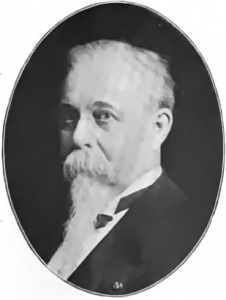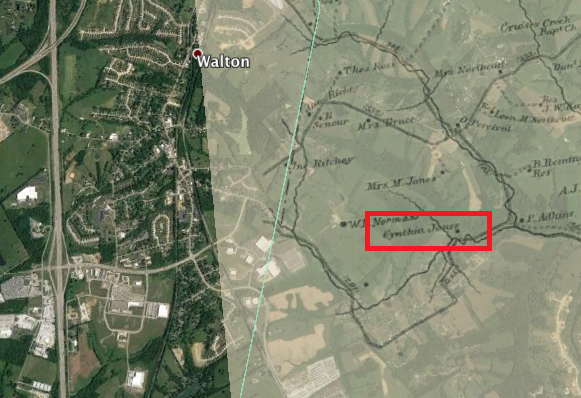
Special Examiner MacBride would have loved to have met Albert Corbin in person, but in the end, he thought Albert’s written letter was sufficient to close the case. He sent his findings to the top guy, William Lochren, the Commission of Pensions in Washington, D.C. MacBride’s conclusion? “Death alone has saved Black from the legal consequences of his acts.”
Hon. Wm. Lochren
Commissioner of Pensions
Washington, D.C.Sir
I have the honor to return papers in above cited pension claim.
Papers were referred to me to determine whether the late husband of the claimant is the person who rendered the service alleged.
I have taken sufficient evidence to show that he was not, and that death alone has saved Black from the legal consequences of his acts.
The survivor’s claim was originally allowed upon misaffirmed testimony. No effort appears to have been made to test the value of comrade John Bills testimony or to ascertain his character for truth. He is a shanty boat occupant somewhere on either the Ohio or Mississippi River and said to be unreliable. He formerly lived at Constance, Ky but has left there long since and no one there seems to know his present P.O. address. If he is a pensioner, his address can be ascertained from data in the files at the Bureau.
While I am well aware that to more completely round out this report, I should take the testimony of Albert Corbin whose letter is hereto attached, I will give my reasons for not doing so at this time.
1st I have shown sufficiently well, that Randolph Corbin and Benjamin Black were two individuals and that the latter did not serve in war with Mexico.
2d. To reach the writer (Corbin) I would either have to go by boat or by rail and having confirmed there is no hotel at Belleview (Grant P.O.) as I am informed, and a trip there by boat would land me late in the night. The other route is a short trip by rail to Erlanger, but nearly 50 miles of heavy riding and two days at least in time would be involved. I laid this matter before Chief Fritts, during his recent visit at Cincinnati and he suggested that I send the case in, with the explanation I have made after which the Bureau can determine whether it is absolutely essential that Corbin’s deposition be taken. If Black was living, the value of Corbin’s deposition would be unquestioned; but there is now nobody to punish, and the widow is convinced that she has no legal claim, though she has been an innocent party all through.
I recommend rejection of the claim.
Respectfully,
Thomas H. BacBride
Special ExaminerBlack (Kentucky born near Corbin) and doubtless knowing his (Corbin’s) death occurred so soon after close of war, took advantage of such knowledge and passed for Corbin and succeeded in obtaining certificate of pension, upon what, I think, was insufficient proof submitted.
Unfortunately for Cynthia, it appears that the Commissioner took no action after receiving this letter. Cynthia was left in limbo for more than ten years concerning her application.

An 1893 landowner map verifies that she was living in the same residence that was described in the deposition she gave that very same year – a farm 1 1/2 miles east of Walton. I believe that she and Benjamin shared that home during their marriage, and then she continued to live there after he died. I’ll have to dig into some land ownership records to find out whether she owned it before her marriage.
In 1894, her attorneys (likely, the firm in Cincinnati), sent in a medical affidavit claiming that general disability prevented her from earning a livelihood. In 1897, she submitted a claim for accrued pension. This prompted some additional activity on the part of the Pension Bureau. An extract of Randolph Corbin’s service record was requested, and it was explicitly noted that “the name of Benjamin F. Black has not been formed on the rolls of [the] Company.”
We find Cynthia in the 1900 census living in Stephenson Precinct in Kenton County. Previously, her farm had been found in the Kochs precinct. Since it was so close to the border between the two precincts, it’s possible that she was still living in the same house but it was enumerated differently in the census for some reason (again, a check of land ownership records will clear this up). In 1900, she still owned the farm free and clear. She had a 19-year-old hired hand listed as a “renter” – James Mathews. This gave me a little bit of a start – that’s the surname of Benjamin’s first wife! At this point, I think it’s just coincidence but frankly, nothing would surprise me with this family anymore!
The pension file contains just one more document after 1900. In 1904, the Pension Bureau FINALLY provides official notification to her lawyers of their ruling:
Jan 12, 1904.
Messrs. A. W. McCormick & Sons,
Cincinnati, OhioMexican War
Wid. Rej. No. 10519
Cynthia C. Black
Benjamin F. Black, alias Randolph B. Corbin
Co. B, 3d Kentucky VolsSirs:
In reply to your letter of May 22, 1903, you are informed that the above-entitled claim for pension under the act of January 29, 1857, was rejected November 15, 1893, after a special examination, in the ground that the claimant’s husband was not in the United States service, It was shown that the soldier Corbin died shortly after the close of the Mexican War, and was personated by claimant’s husband.
The claimant’s last-known post-office address is Walton, Boone County, Kentucky.
Very respectfully,
Commissioner
This is the last record of any kind that I can find for Cynthia – I can’t seem to locate her in the 1910 census, nor can I find a death record, cemetery burial or probate information (although my search has not been exhaustive).
In Part 2, I wrap up with a revised biography of Benjamin F. Black.

